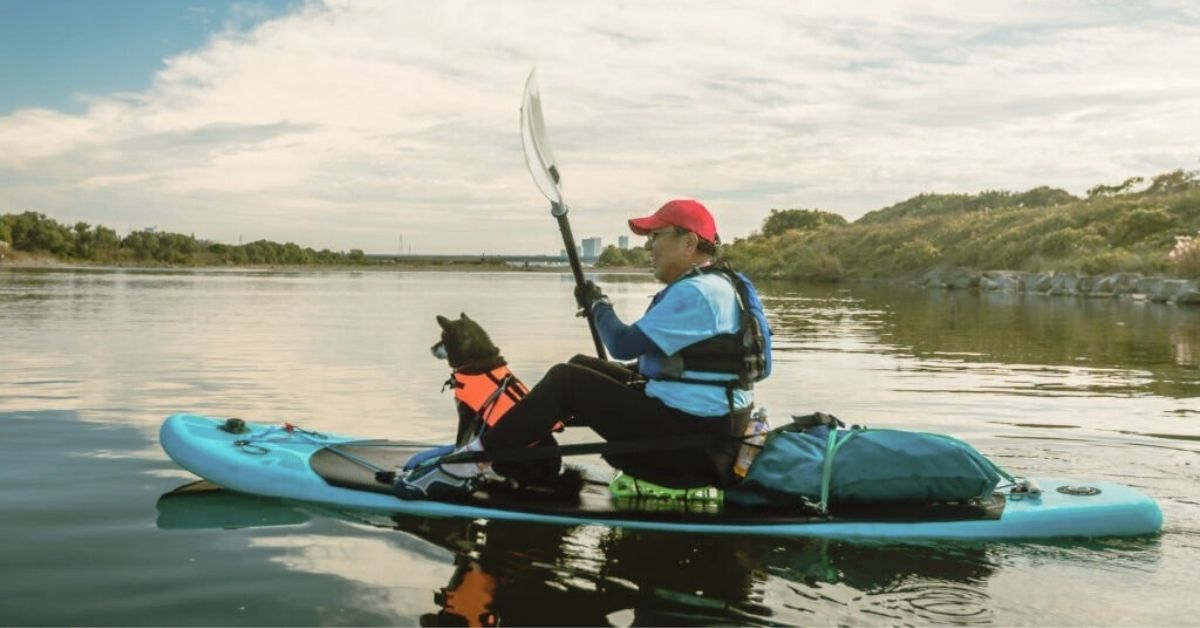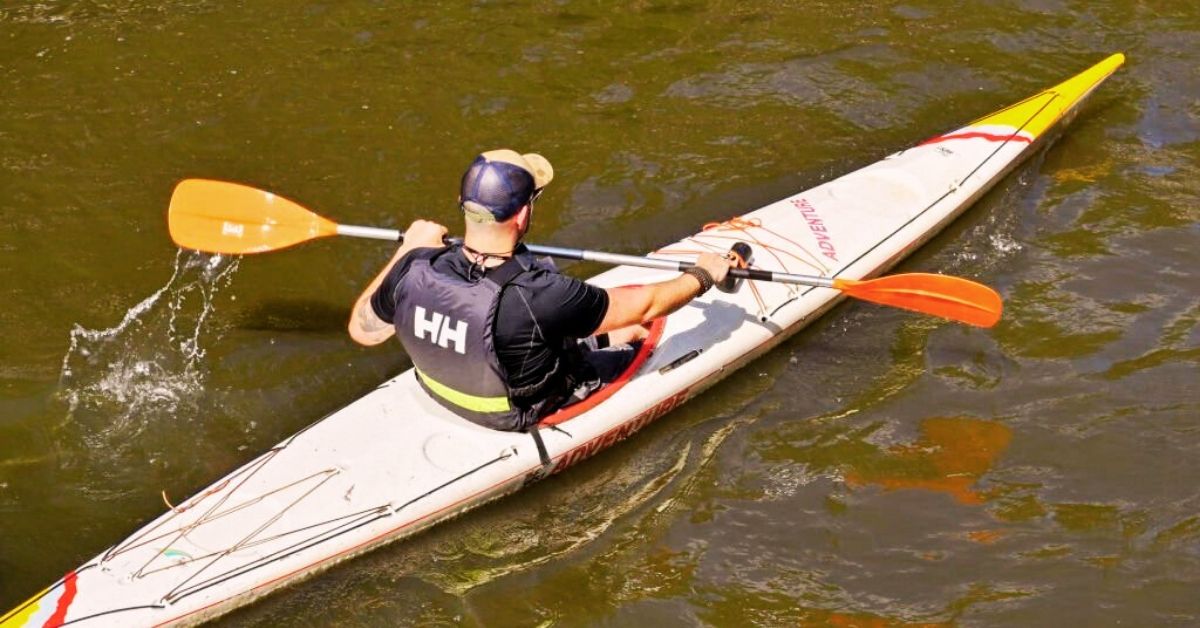Kayaking lets you discover new waterways and enjoy the outdoors. However, kayaking while drunk or high is equally as hazardous as driving.
A DUI while kayaking is not a straightforward yes or no question for many kayakers. Kayaking and alcohol rules differ by state and are complicated. We’ll discuss kayaking and alcohol legislation in this blog article.
Our recommendations will help you remain safe on the water and avoid legal issues. Read on to learn about kayaking and DUI laws if you’re intending to go out with a few drinks.
Table of Contents
1. Introduction
Most people think of vehicles, motorcycles, or bicycles when they hear DUI. What about kayaks? Can you get a DUI while paddling? It’s an unusual question, yet many inquiring minds are attracted by it.
The solution is more complicated than you realize. While kayaking may not include roads or traffic rules, DUI laws are meant to protect the public and prevent drunk drivers from injuring themselves and others.
Many countries apply DUI rules to any vehicle or vessel that may be driven drunk. This implies that kayaking while drunk may still constitute a DUI.
However, local rules and regulations differ, so it’s important to know them. Some states have legislation addressing DUI on watercraft, while others include it within DUI rules for all vehicles.
Unexpected kayak DUI inquiry
There has been a recent inquiry regarding the possibility of receiving a DUI while kayaking. As kayaking continues to grow in popularity as a recreational activity, there is a need to further examine the legal implications of operating a kayak while under the influence.
It is crucial for individuals engaging in this activity to be aware of the potential consequences of impaired kayaking. The legal system should also address this issue to prioritize the safety of everyone involved in water-based activities.
Safety is another issue besides legality. Despite its casual nature, kayaking demands coordination, balance, and judgment. Intoxication impairs motor abilities, judgment, and response time, increasing water accident risk.
This blog article will discuss DUI on a kayak from legal, safety, and repercussions viewpoints. Read on to learn more about the surprising issue of DUI while kayaking.
2. Understanding DUI laws: What is DUI?
To remain legal and avoid penalties, you must understand DUI rules. Driving under the influence usually means driving while intoxicated. The definition of a motor vehicle varies by jurisdiction.
Engine-powered vehicles including automobiles, motorbikes, and trucks are usually termed motor vehicles. These are frequent DUI automobiles. Can you get a DUI in a kayak?
The answer depends on the jurisdiction and circumstances. In certain regions, DUI rules apply to kayaks, canoes, and paddleboards. This implies driving any of these boats while intoxicated might result in a DUI.
The key to a DUI is whether you’re driving or boating while intoxicated. Even though kayaking is not a motor vehicle, you might be charged with DUI.
It’s best to learn about DUI rules in your state. To protect yourself and others, kayaking and other leisure activities must be done safely and responsibly.
3. Applying DUI laws to unusual vehicles: Legal ambiguous situations
Most people associate DUI laws with vehicles, motorbikes, or bicycles. But what about kayaks? Can kayaking get you a DUI?
The solution is more complicated than you realize. DUI regulations are usually established for motor vehicles, the most frequent means of transportation. Some states define transportation as any vehicle or equipment, including non-motorized ones.
In these states, kayakers may be charged with DUI if specific conditions are met. Regardless of the vehicle you drive, being affected by alcohol or drugs, having a blood-alcohol content over the legal limit, or acting erratically may lead to a DUI.
However, DUI laws for kayaks are still unclear. It depends on how each jurisdiction writes and interprets the law. Some states specifically include kayaks in DUI statutes, while others use unclear terminology.
Even if the car is not protected by DUI regulations, it is essential to drive safely. Your and others’ safety should always come first. Remember that alcohol or drug impairment may affect judgment, coordination, and response time regardless of vehicle type.
Influence of Alcohol and Drugs
Operating a kayak while under the influence of alcohol and drugs poses significant risks. Impaired judgment, reduced reaction time, and decreased coordination can lead to accidents and even fatalities.
It is crucial to follow the laws and regulations that govern the use of kayaks, which prohibit operating a kayak while intoxicated. Violating these laws can result in a DUI charge, carrying severe legal and financial consequences.
Kayaking and drinking should be done properly and legally. For compliance and to prevent legal issues, learn your jurisdiction’s laws.
In conclusion, although DUI laws may apply to kayaks differently depending on the location, safety and accountability are essential while partaking in any alcohol or drug-related activity. To guarantee a safe and happy visit, be cautious, know local laws, and make educated judgments.
4. The importance of jurisdiction: DUI enforcement differences
DUI rules and enforcement depend on jurisdiction. Driving under the influence laws differ by state and country. The legality of kayaking while intoxicated varies by location.
DUI rules in certain places apply only to motor cars, not kayaks. Even though the legislation doesn’t specify kayaks, other connected crimes or rules may apply.

Some states ban driving a motorized or non-powered boat under the influence of alcohol or drugs. In certain instances, kayaking a DUI is feasible.
Even though the legislation doesn’t include kayaks, police may exercise their judgment. They may intervene and prosecute you with reckless endangerment or public drunkenness if they suspect alcohol or drugs are impairing your kayaking safety.
Understanding local rules and regulations is essential to comply and prevent legal troubles. Avoid kayaking when intoxicated to protect yourself and others.
Remember that DUI laws aim to avoid accidents, protect people, and promote public safety. Thus, it’s crucial to know and follow your local kayaking and non-motorized boat legislation.
5. Real-life kayak DUI cases
Real-life kayak DUI events illustrate the legal ramifications of paddling while intoxicated. Kayaking is a relaxing hobby, but the same restrictions apply, particularly when it comes to drinking.
A kayaker was stopped by police for erratic conduct. The kayaker swerved and struggled to balance. The cops knew the kayaker was inebriated, and a breathalyzer test showed a high reading.
Another group of buddies went kayaking while drinking. They were unaware that adjacent boats reported their boisterous conduct and loud music to the police. Police came, performed sobriety tests, and arrested the kayakers for drunken boating.
These real-life instances show the dangers of drunk kayaking. Operating any boat, including kayaks, while inebriated has the same legal consequences as driving a vehicle. DUI laws protect water users from accidents and injury.
6. Potential penalties: Kayak DUI legal ramifications
Kajaking may seem like a relaxing hobby, but doing so while intoxicated might have serious legal ramifications. Operating a kayak while inebriated has serious legal consequences.
Many jurisdictions have DUI regulations that go beyond motor vehicles. They commonly incorporate kayaks and other boats. If you’re caught kayaking while inebriated, you might face the same penalties as a drunk driver.
Depending on the jurisdiction, kayak DUI consequences may include fines, license suspensions, required alcohol education programs, probation, and prison time. DUI convictions may also affect your criminal record, job opportunities, and personal life.
Impaired kayaking endangers you and others on the river. Accidents involving kayaks, other boats, swimmers, or stationary objects may cause injuries or deaths.
Risks of Impairment While Operating a Watercraft
Operating a watercraft while under the influence of alcohol or drugs poses significant risks to both yourself and others.
It’s important to understand that impaired judgment and reduced motor skills can greatly impair your ability to safely operate a watercraft, including kayaks. The consequences can be severe, ranging from accidents and injuries to even fatalities.
Additionally, it’s worth noting that operating a kayak while intoxicated can result in a DUI charge. To prioritize safety, always exercise caution and responsibility when operating any watercraft. Avoid engaging in activities that may impair your ability to navigate the waters safely.
To prevent legal and safety issues, kayak responsibly and never drive drunk or high. If you plan to drink while outdoors, appoint a sober driver or find alternate transportation.
Remember, the aim is to have a safe and happy kayaking experience, so knowing the legal penalties and repercussions of a DUI can help you negotiate the law.
7. Preventive measures: Safe and legal tips
Safely enjoying leisure activities like kayaking is crucial to prevent legal issues. Although kayaking may seem like a relaxing hobby, it’s important to know the restrictions.
Here are some kayaking safety recommendations to avoid legal issues:
1. Know Local Laws: Kayaking laws vary by locale. Before entering the water, check for age requirements, permits, and forbidden zones.
2. Always use a correctly fitting life jacket while kayaking: This is a legal and safety measure in many places.
3. Avoid Alcohol or Drugs: Like driving, kayaking while intoxicated is prohibited in many locations. Avoid these drugs before and during your kayaking trip to protect yourself and others.
4. Before kayaking, check the weather forecast: Strong winds, rain, and thunderstorms might endanger your life. Postpone your trip if bad weather is forecast.
5. Inform a Trusted Friend or Family Member: Before kayaking, tell a friend or family member your route and approximate return time. If something unexpected happens, someone will know where you are and can inform authorities.
6. Sharing the Water: Be aware of other boats, swimmers, and kayakers. Avoid accidents and disagreements by following boating etiquette, yielding to bigger boats, and staying away.
Keep these things in mind for safety and legal avoidance. Following these precautions will ensure that you respect the law and prioritize safety when kayaking.
8. Awareness and advocacy: Clarifying DUI legislation for unusual cars
Awareness and advocacy help clarify DUI rules for kayaks and other unusual vehicles. As more individuals use alternate transportation and leisure, legal issues and water safety must be addressed.
Boating clubs and legal advocacy groups are promoting awareness of atypical vehicle DUI rules. They educate the public and politicians about the particular issues and concerns.

This advocacy includes encouraging politicians to evaluate and revise legislation to include these unorthodox means of transportation. These groups want to work with politicians to create clear rules that mitigate the hazards of drunk kayaking.
Public awareness efforts also help people realize the risks of driving any vehicle, even an unorthodox one, while drunk. These advertisements promote human responsibility and the risks of kayaking or other vessels while inebriated.
Advocates must also encourage safe boating and responsible leisure via education. These campaigns might include instructional materials, seminars, or local authority DUI legislation informative sessions for atypical cars.
Advocacy and understanding may help negotiate atypical vehicle DUI rules. The ultimate objective is to make water sports safer by making sure everyone knows their duties and the risks of driving drunk.
9. DUI laws and kayaking: Legal experts’ opinions
We consulted DUI law experts to clarify kayaking and DUI legislation. Their advice on kayaking and DUI laws is helpful.
A veteran DUI defense lawyer, Attorney John Smith, says state rules against kayaking while intoxicated differ. He advises that kayakers must know the local rules and regulations.
Attorney Smith notes that many states ban driving any boat, including kayaks, while inebriated, but others distinguish between powered and non-motorized vessels. A “vessel” may incorporate kayaks in certain instances. However, local laws should be checked to ascertain local requirements.
Sarah Johnson, a marine and boating law attorney, also spoke. She stresses that water-based activities should always be safe. Even if the law doesn’t ban drunk kayaking, poor judgment and coordination may endanger the kayaker and others on the canal.
Attorney Johnson strongly warns avoiding drinking or using drugs to kayak safely. She urges kayakers to enjoy their water excursions while following the law and protecting themselves and others.
Note that these observations are generic and not legal advice. If you have issues about DUI laws and kayaking, seek a knowledgeable legal practitioner who knows your local laws.
Remember, knowing the laws of kayaking under the influence is essential for your safety, others’, and legal avoidance.
10. Conclusion: Recreational activities while educated and accountable
Finally, while having fun, keep aware and responsible. Understanding the rules and regulations for kayaking, paddleboarding, and other water-based sports is crucial to your and others’ safety.
While a kayak DUI may seem implausible, driving any watercraft under the influence of alcohol or drugs may have serious implications. Always avoid drinking and other impairing drugs during swimming.
You should also learn about local and state rules governing these leisure pursuits. Understanding where you may kayak, age limitations, and other requirements can help you avoid legal concerns and have a fun time on the water.
Staying aware and responsible lets you enjoy leisure activities while respecting the law and your own and others’ safety. Before your next kayaking trip, learn the rules and make responsible decisions to guarantee a fun and safe experience.
